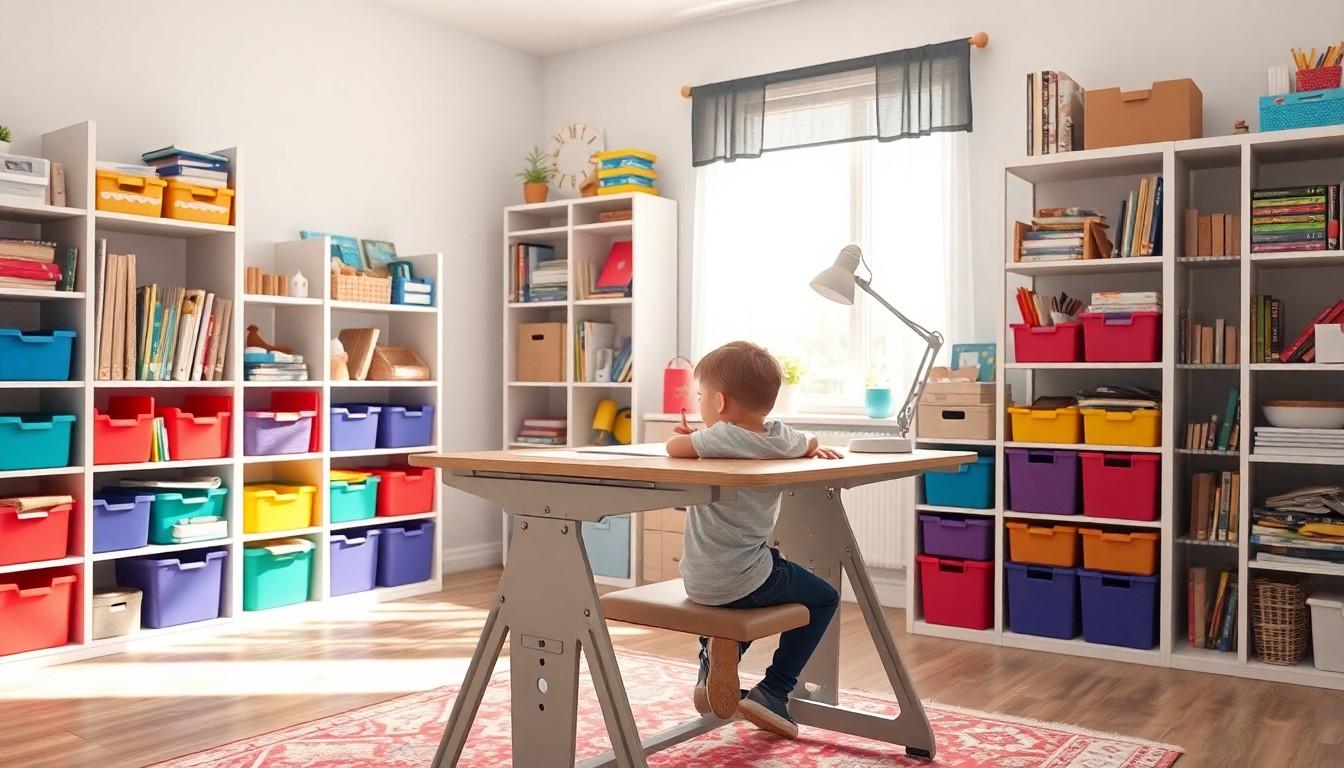Creating a dedicated homework room for kids might just be the secret sauce to academic success. Imagine a space where creativity flows as freely as the snacks, and distractions are kept at bay like a ninja in a library. A well-designed homework room can transform the dreaded homework grind into a fun and productive adventure.
Table of Contents
ToggleImportance of a Kids Homework Room
A dedicated homework room plays a crucial role in academic achievement. This space encourages children to focus on their studies and enhances their learning experience. A well-arranged environment can significantly reduce distractions, making it easier for kids to concentrate on assignments.
Proper organization is vital in such a room. Having essential supplies like books, stationery, and a computer within reach allows children to work efficiently. Studies indicate that children equipped with the right tools tend to perform better academically.
Creativity thrives in a comfortable workspace. Personalizing the homework room with inspiring decorations can motivate children to engage more deeply with their schoolwork. Research shows that an appealing environment boosts creativity and productivity, leading to better learning outcomes.
Setting a designated homework area establishes clear boundaries for work and play. Children benefit from understanding that certain spaces are meant for study, which can enhance their focus. Establishing a routine in this space helps reinforce good study habits.
Parents also find it easier to support their children’s learning in a dedicated homework room. Supervising homework gets simpler when everything is in one location, allowing parents to provide assistance when necessary. Collaboration in this space can strengthen the parent-child bond, promoting a positive attitude toward learning.
Ultimately, investing in a kids homework room contributes significantly to a child’s educational success. By fostering an organized, inspiring, and focused environment, children are better equipped to tackle homework with confidence and enthusiasm.
Essential Elements of a Kids Homework Room

Creating an effective homework room involves selecting key elements that enhance focus and productivity. Prioritizing comfort, organization, and lighting makes a significant impact on a child’s study habits.
Desk and Chair Considerations
Choosing the right desk and chair is crucial for comfort during homework sessions. A height-adjustable desk accommodates growth, ensuring longevity. Ergonomic chairs support posture, helping prevent discomfort during long study hours. Space for books and materials nearby encourages independence and reduces distractions. Personal touches, like a favorite color or design, engage a child’s interest in their workspace.
Storage Solutions
Effective storage solutions play a vital role in maintaining an organized homework area. Shelves and bins can house books, art supplies, and homework materials, ensuring easy access. Clear storage containers allow visibility, making it simple for kids to find what they need. Vertical storage optimizes space, especially in smaller rooms. Labeling items fosters responsibility and accountability in maintaining organization.
Lighting Options
Adequate lighting is essential for a productive homework environment. Natural light enhances focus while reducing eye strain. Adjustable desk lamps provide targeted illumination for detailed work and reading. Overhead lights complement desk lighting, creating a well-lit atmosphere. Dimmable options allow for flexibility, accommodating various tasks and preferences.
Creating a Distraction-Free Environment
Establishing a distraction-free environment enhances focus in a kids’ homework room. This space should minimize all potential interruptions for optimal productivity.
Noise Management
Control noise levels to create an ideal study space. Soft furnishings, like rugs and curtains, absorb sound, reducing overall noise. Install acoustic panels to further dampen outside distractions. Designate quiet hours when other family members limit noise, ensuring an uninterrupted study atmosphere. Encourage the child to use noise-canceling headphones if needed, helping them concentrate better on assignments.
Digital Distractions
Address digital distractions by setting guidelines for device usage during homework time. Establish phone-free zones within the homework room to divert attention away from screens. Schedule specific times for checking devices to maintain focus on schoolwork. Utilize apps that block distracting websites during study sessions, keeping learners on task. Parents can also model good habits by maintaining their own device discipline, reinforcing a culture of focused work.
Personalizing the Space
Personalizing the homework room enhances a child’s motivation and engagement. Thoughtful design choices create an inviting atmosphere that fosters creativity.
Color Schemes and Décor
Selecting a color scheme influences mood and productivity. Bright colors like yellow or green stimulate creativity, while cooler tones promote calmness. Wall art, framed pictures, or motivational quotes can inspire children during study sessions. Adding personal touches, such as their artwork, makes the space feel unique and more engaging. Incorporating fun elements, like a chalkboard or a pinboard for reminders, can also keep the area dynamic. Personalizing decorations according to the child’s interests ensures the room remains appealing and relatable.
Functional Organization
Organizing the homework space promotes efficiency and independence. Clearly defined zones for different activities streamline workflow. Using labeled storage bins can help kids easily find their supplies. A dedicated area for books, notebooks, and art materials reduces clutter and distractions. Adjustable desks support varying tasks and allow comfort during different study phases. Incorporating a calendar or planner in the layout encourages time management skills. Thoughtful organization strengthens focus and cultivates a sense of responsibility in children.
Tips for Parents to Support Homework
Parents can play a pivotal role in supporting their children’s homework routines. Establishing a structured environment encourages productivity and academic success.
Establishing a Routine
Setting a consistent homework schedule proves beneficial. Children thrive when they know what to expect, creating a sense of security. Dedicate specific times for homework each day, reinforcing that learning is a priority. Parents should communicate openly about daily assignments, ensuring that children stay on track. Time management skills also develop when routines are practiced regularly. Begin with engaging discussions about upcoming projects and due dates, fostering motivation. Additionally, incorporating breaks into study sessions helps maintain focus, allowing for mental rejuvenation.
Encouraging Independence
Promoting independence fosters self-confidence in children. Parents can provide guidance while allowing kids to make their own choices regarding homework. Start by offering a selection of study materials, helping them learn how to choose resources effectively. Encourage children to take ownership of their tasks by setting personal goals and tracking their progress. Allowing time for problem-solving develops critical thinking skills. Parents should celebrate achievements, no matter how small, reinforcing positive behaviors. By cultivating a sense of responsibility, kids learn to manage their workload effectively and enhance their learning experience.
Creating a dedicated homework room is an investment in a child’s academic journey. This space not only enhances focus but also fosters creativity and independence. By prioritizing comfort and organization, parents can help their children develop effective study habits that last a lifetime.
Personalizing the environment encourages motivation while establishing boundaries reinforces the importance of learning. With the right tools and a supportive routine, children can thrive in their studies. Ultimately, a well-designed homework room transforms homework from a chore into an enriching experience, paving the way for educational success.


